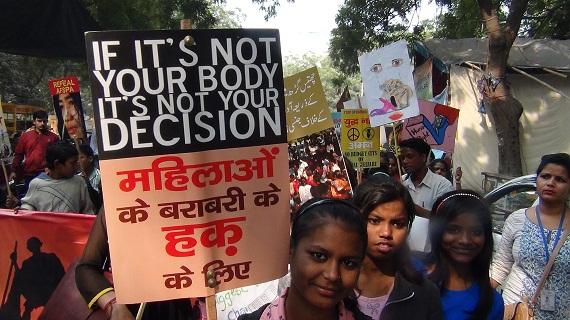HEADLINE
Gender battle over right to worship in India
"It is evoking calls from women from across the religious spectrum."

A woman’s movement challenging a centuries-old practice of denying women entry into the most sacred areas of worship in Hindu temples and Muslim shrines is generating a heated debate across India.
It is evoking calls from women from across the religious spectrum, uniting those who believe the practice is a violation of fundamental rights and religious freedom.
Bismillah Geelani has the story.
At New Delhi’s Hazrat Nizamuddin shrine, a group of musicians is performing a Qawwali, or a Sufi devotional song.
Hundreds of men and women including many foreigners are seated in a circle around the musicians listening attentively to the Urdu and Persian lyrics.
The song is in praise of the 14the century Sufi saint Nizamuddin Aulia who lies buried in the shrine.
Hazrat Nizamuddin is one of the world’s most famous Sufi shrines and equally popular among Muslims and non-Muslims.
Deputy administrator of the shrine, Afzal Nizami, says its doors are open for all.
“The Sufis came with the message of peace, love and brotherhood and these are concepts that humanity will always need in order to survive. The Sufis spread their message from shrines like these and it was for everyone so anyone, whether believer or atheist has always been welcome here,” he says.
While anyone can visit the shrine, the entry to the most sacred space-the grave of the saint, is restricted to men.
Women are traditionally kept away from it. Nizami explains the reason.
“Every system has its own way of functioning and this is the way it works here and it has been like this for centuries. The reason basically is Islam does not allow intermingling of men and women,” he adds.
Similar practices of restricting women’s access to the places of worship are followed at various other shrines, mosques and Hindu temples.
But strong voices of protest challenging the archaic notions have begun to emerge.
The debate gained momentum after an announcement at the Sabrimala Temple in the southern state of Kerala.
The temple wanted to install a machine at the temple gate to scan women devotees...
As a centuries-old tradition only women who have reached menopause or haven’t yet hit puberty, are allowed inside the temple.
Bhakti Pasricha is a lawyer. She has filed a lawsuit against the temple authorities accusing them of discrimination against women.
“The temple authorities then washed the entire temple to purify it and created such a hue and cry about the whole thing,” she says, “It was so humiliating. We thought that on the one hand we are being taught about the right to equality and when someone being an equal devotee and follower of the same religion tries to practice it this is how she is being treated.”
The announcement by temple authorities last year sparked an online women’s campaign called, ‘Happy to Bleed’.
Activists like Nikita Arora used sanitary napkins as placards with slogans against gender inequality.
“Bodily functions should not be offensive; men should not be in a position where they judge women for going through something that is so natural,” argues Arora, “It’s about time that we stop letting men make decisions for women based on their bodies, it is not fair.”
The campaign spread across the country and soon took the form of street protests with women storming temples and shrines demanding their right to worship freely.
Fifty-year-old Asha Devi joined one such protest earlier this month in the Western state of Maharshtra.
“This is injustice. Why can’t women go where men can? How are we different? We are also created by the same God. He created us as equals then why are these men discriminating against us,” says Devi, “Why do they deprive us of our rights? This can’t go on like this anymore.”
The women’s agitation has brought out deep divisions in the Indian society – and a debate is raging between traditionalists and the modernists across the country.
Hindu religious leader Acharya Ajay Sharma insists that tradition is supreme and must be adhered to.
“What we do following our whims and wishes is arbitrary but what we do following scriptures and tradition is wisdom. Men and women are not equal. They are different and their rights are defined,” he says, “Women enjoy special rights and special protections. But they can’t always have it both ways.”
Several women’s groups have approached courts urging legal remedies to end the discriminatory practices.
But some warn that confrontation could create further divisions.
Madhu Kishwar, editor of the monthly Women’s magazine Manushi believes that consultation and cooperation is the way to bring about a real change.
“These traditions will have to go but the change cannot be forced from outside, it has to come from within,” she says, “There should be a dialogue between the devotees and consensus to change something... If we force our way through law, police or any other means we will only make the change even more difficult.”
- eng
- Bismillah Geelani
- India sacred area
- women rights
- India women denying entri sacred areas
Komentar (0)
KBR percaya pembaca situs ini adalah orang-orang yang cerdas dan terpelajar. Karena itu mari kita gunakan kata-kata yang santun di dalam kolom komentar ini. Kalimat yang sopan, menjauhi prasangka SARA (suku, agama, ras dan antargolongan), pasti akan lebih didengar. Yuk, kita praktikkan!